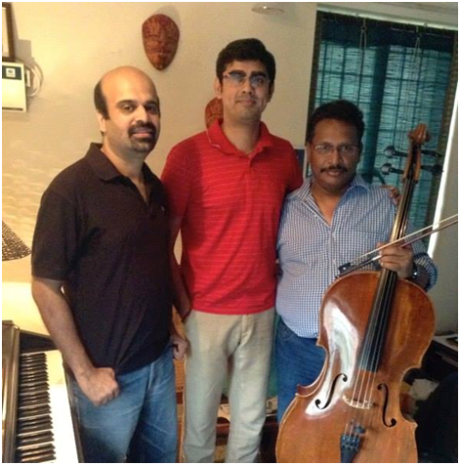This morning (15th Dec 2013), I went to the Russian Cultural Centre to listen to a trans-continental (my description) fusion music of Anil Srinivasan on the Piano, Sikkil Gurucharan on the vocals rendering carnatic music and Sekar on the Cello.
Why Trans-Continental? Piano and Cello are instruments of European origin (and so is Violin), the vocal music was Carnatic, the percussionist being a tabla player, hence Hindustani and they also played ‘Swan Lake’ of Tchaikovsky (of Russia).
The underlying theme was ‘Swan’ from beginning to end. Let’s now get to the concert.
The first was ‘Swan Lake’ of Tchaikovsky interspersed with the memorable ‘katrilinele varum geetham’ rendered so soulfully by Anil and Sekar. Very soothing and calm. I guess that Tchaikovsky had some influence on Ilayaraja because i could hear strains of Raja’s BGM while listening to Swan Lake.
Due to a commotion with a lady trying to get into the row (where I was seated at the end) and asking me ‘when did the concert begin?’, I could not follow Anil’s introduction to the next piece nor could i enjoy it. Part of the game, I guess. Thankfully, I did not hear even one mobile ringtone!! Either our audience have become so sensitive and hence put it on silent mode or there were no calls to anyone, being a sunday morning!!
It was time for Sikkil Gurucharan’s (SG) entree and Sekar left the stage (to join later). Here is where Anil elaborated on the ‘Swan’ on different dimensions and how it resembles human potential. When he made the connection of great people being called ‘ParamaHamsa’, there was a genuine and spontaneous appreciation from the audience.
The piece started with a verse from Vedanta Desikar’s ‘Hamsa Sandesham’ and then went on to Thygrajar’s immortal ‘Sujana jeevana’ in Harikhamboji. Although Anil and SG have been performing together for 7 years now, I have never heard them and hence was quite curious how a piano will fare as a co-player (would not like to call it as an accompanist) in a carnatic music. I must say that i was pleasantly surprised and even delighted given the tonality that is so inherent of the piano and Anil’s playing. Was reminded of Vellore Ramabhadran’s accompaniments which used to be like caressing and flowing with the vocal music.
The next item really posed some challenges to me. It was a Ragam Thanam Pallavi (as it unfurled) and the artists really had me guessing about the Raga. When Anil began, I thought it was Dharmavathi but as it moved on, I was confused because i thought i heard some different notes as well. It was in the Thanam that both Anil and SG excelled with a Ragamalika. I have often heard ragamalikas in the kalpana swaras post the pallavi and it was the first time i was hearing it at the thanam stage itself. I was delighted as many in the audience by the seamless transition from Dharmavathi to Vasantha (am still awaiting Anil’s confirmation on that) to Hamsanadham to Hamsadhwani and i also thought i heard Hamsanandi. I am not sure if they rendered the swarams in the same order though!
The pallavi went “Kesavam Madhavam Vasudevam – Gopika vallabham Bhaje” in Simhendra Madhyamam (an almost neighbouring raga to Dharmavathi). I was perplexed by the choice of the tabla as the percussion instrument in a carnatic western music concert but the outcome was great. The tabla player Jagjeeth really played in close consonance to the main players. The kalpana swarams were equally mesmerising.
I was surprised about the selection of Andal’s ‘Chitram chiru kaale’ in Madhyamavathi at this juncture because Madhyamavathi is sung at the end of the concerts traditionally and wondered whether the concert was getting over. Thankfully, it was not to be as Sekar joined the other two in rendering Lalgudi Jayaraman’s Desh Tillana sans the percussion support. Sekar’s Desh was really moving and brought out the essence of the raga. It was wonderful listening to the three players in unison.
Next was an arrangement in the ragam Suddha Saveri by legendary violinist VS Narasimhan that was followed by a rendition of Kulasekara Azhwar’s Pasuram (the first part of the famous ‘pavazha vaai kaanbene’ on Tiruvengadamudaiyan). I could see how Ilayaraaja had brought out the essence of the Suddha Saveri raga in his ‘kadhal mayakkam’ song from the movie ‘Pudhumai penn’.
Anil brought the concert to a close and thanked everybody for being there, when my friend Ramesh shouted from the audience asking for one more composition. When this snowballed into a huge demand, Anil gracefully accepted and the artists rendered the well-known Swati Tirunal Tillana in the raga Dhanashree (also known as Abheri) in a brisk fashion. (I had learnt this Tillana from my guru Param Thillairajah at Sydney and we sang this at the Sydney Murugan temple performance and at Melbourne. You can read my memories of my guru who passed away last year here, here and here)
I had earlier listened to Anil at the Max Mueller Bhavan recently when he played classical western music but today he was equally adept at carnatic music. His introductions to the individual songs was bang on and he was quick on the uptake when there were some slight disturbances on the mike as well.
When I met SG after the event and asked him about the difference between Dharmavathi and Madhuvanthi (its equivalent in hindustani music), he quickly and clearly explained it with an instant short demo. I think he can deliver led-dems as well (if he is not doing so already). (A part review of SG’s recent concert at Bharat Kalachar can be read here)
What a wonderful way to spend a sunday morning? Thank you www.sabhash.com and Tchaikovsky Music Club for the opportunity.
